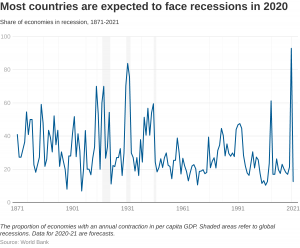A review based on the article “The Global Economic Outlook During the COVID-19 Pandemic: A Changed World” published by The World Bank.
The COVID-19 pandemic affected every single person on earth, either directly or indirectly. More than 90 million people getting infected and more than 20 million people dying are the most direct and evident effects of this pandemic. But this doesn’t mean that the non-infected people are safe. From a medical point of view, they could be either a carrier or have the probability of getting infected at any point. However, there are many more harmful effects taking place via economic aspects under the obvious. These are indirect, long-termed, and affect all over the world without sparing any.
The blow this pandemic landed on the world’s economy is massive and its effects are imminent. It is evident through the forecasted 5.2% contraction in global GDP. The pandemic will trigger deep recessions. This will leave severe damages via low investments, erosion of human capital, and global trade fragmentation.
Due to the prevailing differences in economies of different countries, the vulnerability of populations to the economic downfalls of this pandemic varies. Emerging markets and developing countries are rather more vulnerable than developed countries.

This economic crisis came into action with the locking down of countries where essential productions were carried out and isolating the communities. In one way this depraved man labor needed, and in another way prevented importing of necessary raw materials as well as exporting the produced goods. On the other hand, the curfews placed restricts almost all the modes of travel and transport. This single point alone resulted in severe consequences. Because it collapsed the demand for crude oil and other transport-related commodities such as metal and rubber.
With halted production, governments and communities are forced to use their monetary reserves as well as goods and services. The major problem regarding all these is that all the recovery steps have to be carried out while counteracting their domestic outbreaks of the virus, not only once but in several waves. Strengthening the health care system is one of the critical steps in fighting against this pandemic. However, it demands a lot of resources and manpower which is costly given the situation.
Pressures of weak health care systems, loss of trade and tourism, dwindling remittance, debts, and subdued capital flows make facing the economic crisis that much harder. Persisting pandemic stretching in even to the new year 2021 makes the repercussions more severe. To overcome them, as whole governments should strengthen the public health system and ensure sustainable growth, which are not easy targets. As short-term solutions, governments should address the prevailing health crisis effectively and immediately and try to contain short-term economic damages. In the sense of long-term, comprehensive reform programs should be implemented considering sustainable development as the number one priority.

Even though all these steps are taken up to the fullest capacity, it might not be enough. There would be massive cuts in job markets all over the world. Due to mitigation measures, used in the pandemic, industries started to depend on automated systems than they were used to. This posed a profound threat to man labor. Mostly, labor comes from low-income communities. This will be a hard strike on them and might cause extreme poverty in some parts of the world.
Besides, even some populations are not affected as mentioned earlier, if the affected areas are responsible for providing essential goods and services, drawbacks in these processes will eventually catch up with the less vulnerable populations too. Each economy is linked together in a massive web. Thus failure in one part will automatically affect the rest. To get out of this mess, it is essential to face the challenges as a whole.
Aiding and supporting the private sector should also be brought to attention. Promoting household economies is another way of reducing impacts. Supporting the business which struggles to serve debts, experience climbing burrowing costs, and bankruptcies are also key elements in the recovery plan.
The weaker economic growth that is already experiencing by emerging markets and developing countries makes it very difficult to face the challenges posed by this pandemic. Thus most countries can’t afford to entertain the idea of complete lockdown and severe mitigation measures anymore. This causes the populations to be more exposed to virus outbreaks. Yet, in a way, it would help attain herd immunity. Against the opinion of the majority, however, the greater good concept has to be implemented. Because halting all the essential services and the processes will not be a solution as the pandemic survives in the societies for a longer period.
Thus regarding all, it would be most wise to move along with the available resources and make use of them. Simultaneously, it is essential to face the challenges posed by this pandemic more broadly and globally, because we all are in this together.
Reference :
Image Courtesy :
- Title image: http://t.ly/xzHA
- 1st content image: http://t.ly/ZZwV
- 2nd content image: http://t.ly/c0w7

